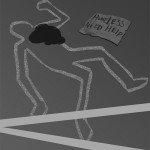
By Ben Markley
In 2008, the Salvation Army said there were as many as 40,000-50,000 homeless people living in Johnson County. With the economy still struggling to get back on its feet and the national incarceration rate increasing, many wonder how economic struggle can affect crime.
Andrew Ward, adjunct professor, Psychology, said unemployment alone cannot be blamed for criminal activity.
“Poverty doesn’t seem to be a predictor of crime,” he said. “Unemployed people aren’t more likely to commit crimes than people with jobs.”
From a psychological perspective, Ward said there was very little connection between poverty and crime. Rather, it is the environment of poverty that can lead people to commit crimes.
“It’s not just being poor, but it’s being around lots of poor people,” Ward said. “The relationship between poverty and crime is in areas of concentrated poverty, like these inner city areas.”
Ward said living in an area of concentrated poverty can be a catalyst for futility.
“It can be a contributing factor of hopelessness and despair,” he said. “‘What do I have to lose? I might as well commit a crime.’ But really, anyone can go into despair.”
Another factor is what Ward called the “escalation of violence.”
“There is phenomenon among people who live in concentrated poverty,” Ward said. “I call it pre-emptive aggression. If you’re someone who lives in an area that’s kind of dangerous, you commit an act of crime so people know not to mess with you. You need to show you’re tough, but now I have to be tougher than you, so I need to go commit a worse crime.”
Frank Galbrecht, associate professor, Administration of Justice, said that poverty does not statistically show itself to be a direct cause of criminal activity.
“Poverty alone doesn’t determine crime,” Galbrecht said. “There is no one factor that you point at and say, ‘This causes crime.’”
In the midst of America’s economic struggle, with more and more people losing jobs and facing financial difficulty, it seems as though the statistics should be predictable.
“2008 rolls around, we’re on the verge of economic meltdown, and logic would tell you that there’d be an increase in crime,” he said. “However, while incarceration has gone up, crime is actually declining.”
Ward said the current decrease in crime rates had several factors, one of which involved the age of the population.
“Young people commit most of the crimes,” he said. “We have an aging population.”
Galbrecht said that perhaps part of social perceptions about the link between crime and poverty has to do with how well crime can be concealed.
“Drug possession and abuse happens across all classes,” he said. “It’s just more visible sometimes in areas that are more deprived.”
This visibility of crime in areas of concentrated poverty comes partly from the deprivation of the community.
“If an area is a vibrant area with lots of social institutions – schools, community buildings and so on – they can absorb the effects of crime,” Ward said. “The effects just aren’t as large. But if you live in an economically deprived area, there’s just not a lot of stuff there. You’re more likely to feel the effects due to a lack of these institutions.”
Galbrecht said that addressing crime would involve addressing poverty, along with a number of other factors within the community.
“You cannot arrest your way out of crime,” he said. “You’ve got to have a focused multi-strategy plan, with partnership between the police, the community and the local government.”
T.J. Tesdahl, student, said he thought the solution started in the classroom.
“For me, it’s all about education,” he said. “You’ve got to get kids in classrooms so that they’re learning how to get jobs and be good people instead of running around with gangs.”
Galbrecht said the best way to address crime was through what he called “collective efficacy.”
“The more people trust each other in a town, the more they have good schools, good tax base, the more they care about each other,” he said. “People in the community have got to be involved with each other if we’re going to fix these problems.”
Contact Ben Markley, sports editor, at [email protected].
Related articles:






















[…] Poverty on trial: Does poverty cause crime? Share this:EmailPrintFacebookStumbleUponRedditDiggSharePress This ▶ No Responses /* 0) { jQuery('#comments').show('', change_location()); jQuery('#showcomments a .closed').css('display', 'none'); jQuery('#showcomments a .open').css('display', 'inline'); return true; } else { jQuery('#comments').hide(''); jQuery('#showcomments a .closed').css('display', 'inline'); jQuery('#showcomments a .open').css('display', 'none'); return false; } } jQuery('#showcomments a').click(function(){ if(jQuery('#comments').css('display') == 'none') { self.location.href = '#comments'; check_location(); } else { check_location('hide'); } }); function change_location() { self.location.href = '#comments'; } }); /* ]]> */ […]